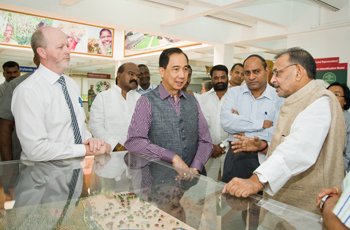Agri minister urges ICRISAT to take up research in pulses
June 26, 2014 | Thursday | News | By BioSpectrum Bureau
Agri minister urges ICRISAT to take up research in pulses
Mr Radha Mohan Singh (R), union minister for agriculture, interacting with Dr William D Dar (L), director general, ICRISAT, and other senior ICRISAT staff at the institute's headquarters in Patancheru, Hyderabad.
"Taking technologies that are ready to the doorstep of every small farmer in the country is a priority for the union government. With support from ICRISAT and other agricultural institutions, we will reach out to more farmers in rural India," said Mr Radha Mohan Singh, union minister for agriculture while on a visit to ICRISAT headquarters in India at Patancheru, Telangana on June 23, 2014.
"We must improve the health of soil for the benefit of smallholder farmers. I urge ICRISAT to upscale plans to extend soil health cards to every farmer in the country," the minister added.
Recognizing the importance of pulses in enhancing food security and incomes of smallholder farmers, the minister discussed with ICRISAT, the Union Government's priority in upscaling the cultivation of pulses and making them more competitive and attractive to farmers. He pledged additional support to the efforts of ICRISAT to enable a Pulses Revolution in India.
ICRISAT director general Dr William D Dar, deputy director general-research
Dr CLL Gowda and other members of the senior management team, briefed the minister on the various research programs at the institute. While visiting the ICRISAT Centre of Excellence in Genomics, the director general shared with the Minister the idea of an India Genome Center for Agriculture which has the potential to transform India into a global leader in genomics. The initiative focuses on areas critical to food security and aims to coordinate the work of all genomics institutes across the country.
Enhanced support to value chains of nutri-cereals like sorghum and millet which have been traditional crops in most areas across the country is essential. With high nutritional composition and resilience to survive in dry areas, nutri-cereals will be critical to India's future, helping overcome malnutrition and to cope with climate change. ICRISAT has been working closely with several organizations in the country on sorghum and millet but recognizes the need for new intensified efforts to promote them robustly at the consumer level.
ICRISAT's plans for a farmer-centric rainwater harvesting model were also detailed to the minister, while viewing a 3-D model of how watershed management benefits farming.
Minister RM Singh also toured the Center of Excellence for Information and Communications Technology (ICT) in Agriculture, the RS Paroda Gene Bank and interacted with the scientists.
He expressed keen interest in encouraging ICRISAT's highly successful ICT models Krishi Gyan Sagar and Krishi Vani-powered by the Green SIM. Krishi Vani, a mobile-mediated agro-advisory platform, is delivering voice messages in regional languages to smallholder farmers across Telangana, Andhra Pradesh and Karnataka, on weather, market, crop information, government schemes, nutrition, and health.
He also enquired of ICRISAT's activities in states of Telangana, Karnataka, Uttar Pradesh, Bihar, and Jharkhand and urged scientists to intensify their efforts in mapping soil health.
"The country and smallholder agriculture have benefitted hugely from the efforts, contributions and innovations of ICRISAT over the past few decades. I urge the institute to enhance and expand its activities to all states and help farmers mitigate climate adversities," the minister said.
Responding to the minister's request, Dr WD Dar reiterated ICRISAT's commitment to help smallholder farmers in the dryland areas of Asia and Africa.
"We will upscale our work, innovate and explore new ways and means to assist smallholder farmers move from poverty to prosperity. Through research activities, community-based interventions, and institutional and policy innovations, we will revolutionize smallholder agriculture together," Dr WD Dar informed the minister.









